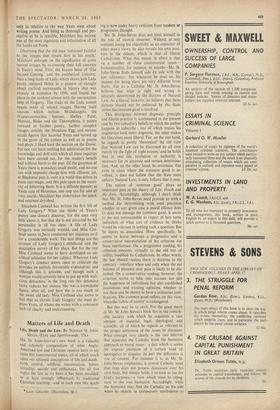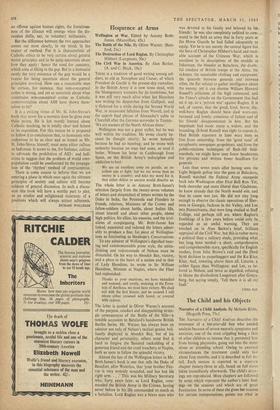Matters of Life and Death
Life, Death and the Law. By Norman St. John- Stevas. (Eyre and Spottiswoode, 35s.)
* LADY GREGORY. (Macmillan, 300 MR. ST. JOHN-STEVAS'S new book is a valuable and scholarly compendium of what Anglo- American law and Christian opinion have to say upon five controversial topics, all of which touch upon our ultimate conceptions of life and death : birth control, artificial insemination, homo- sexuality, suicide and euthanasia. On all five topics the law as we have it has been moulded, or at least strongly influenced, by traditional Christian teaching: and in each case this teach-
ing is now under heavy criticism from modern or progressive thought.
Mr. St. John-Stevas does not limit himself to the role of neutral observer. Without at any moment losing his objectivity as an expositor of other men's views, he also reveals his own posi- tion in the debate, which is that of liberal
Catholicism. What this means in effect is that on a number of these controversial issues— homosexuality, for instance, or suicide—Mr. St.
John-Stevas finds himself side by side with the law reformers: but whenever he does so, his
reasons for being there are very different from
theirs. For as a Catholic Mr. St. John-Stevas believes that what is right and wrong is
uniquely determined by the dictates of Natural Law. As a liberal. however, he believes that these dictates should not be enforced by the State unless the common good is involved.
This divergence between dogmatic principle and liberal practice is accentuated in the present case by two subsidiary beliefs to which the author happens to subscribe: one of which makes his dogmatism look more dogmatic, the other makes his liberalism more liberal. For, on the one hand, he regards as purely 'theoretical' the old view that Natural Law can be discerned by all men merely by the light of 'right reason,' and he holds that in real life revelation or authority is necessary for its accurate and certain determina- tion. And, op the other hand, he maintains that even in cases where the common good is in- volved, it does not follow that the State must enforce Natural Law; it only follows that it may.
The notion Of 'common good' plays an important part in the theory of Life, Death and the .Law. Accordingly, although I don't think
that Mr. St. John-Stevas need ,provide us with a method for determining with total precision whether in any given case a moral offence does or does not damage the common good, it seems to me not unreasonable to expect of him some indication of what sort of evidence he thinks would be relevant in settling such a question. But he leaves us unsatisfied. More specifically, he seems to hover between a progressive and a conservative interpretation of his criterion for State interference. On a progressive reading, his criterion amounts virtually to the old test of utility, modified by Catholicism. In other words, the law should—unless there is doctrine to the contrary--interfere when and only when the net balance of pleasure over pain is likely to be dis- turbed. On a conservative reading, however, the criterion seems to take into account not just the happiness of individuals but also established institutions and existing opinions, whether or not these can be shown to have a utilitarian justi- fications. The common good suffers; on this view, when the `fabric of society' is endangered.
But this may be to cavil. For the great merit of Mr. St. John-Stevas's book lies in the remark- able lucidity with which he organises a vast amount of material, legal, theological and scientific, all of which he regards as relevant to the proper settlement of the issues he discusses.
What emerges very clearly is the vast interval that separates the Catholic from the humanist approach to moral issues: a fact which it seems the express intention of a certain kind of apologetics to disguise. In part the difference is one of content. For instance it is, as Mr. St.
John-Stevas emphasises, a central Catholic tenet
that man does not possess donlinitint over his own body. but merely holds it in trust to use for
God's purposes—a view which must be repug- nant to the true humanist. Accordihly, while the humanist may find the Catholic on his side when he objects to compulsory sterilisation as an offence against human rights, the fortuitous- ness of the alliance will emerge when the dis- cussion shifts, say, to voluntary euthanasia.
But the difference between the two approaches comes out most clearly, to my mind, in the matter of method. For it is characteristic of Catholic ethics to be very certain about general moral principles and to be quite -uncertain about how they apply: hence the need for casuistry, which aims at filling in the gap. But to a humanist surely the very existence of the gap would be a reason for being uncertain about the general principles involved. How can a reasonable man be certain, for instance, that non-conceptual coitus is wrong, and yet as uncertain about what constitutes non-conceptual coitus as Catholic controversialists about AIH have shown them- selves to be?
It is a striking virtue of Mr. St. John-Stevas's book that never for a moment does he gloss over these points. He is not merely learned about Catholic teaching, he is totally clear and honest in its exposition. For this reason he is prepared to follow it to conclusions that, to humanists who endeavour to be as clear and as honest as Mr. St. John-Stevas himself, must seem either callous or ludicrous. It seems to me, for instance, callous to advocate the prohibition of AID: and ludi- crous to suggest that the problem of world over- population could be ameliorated by the propaga- tion of the 'rhythm' method of contraception.
There is some reason to believe that we are entering a phase in which once again the ultimate principles of society and culture will become subjects of general discussion. In such a discus- sion this book will have a worthy part to play, as an erudite and enlightened statement of a positions which will always attract adherents.
RICHARD WOLLHEIM



































 Previous page
Previous page